MASLD Basics With Lindsay Yoder
Chat with MASLD AI

Hi, I am MASLD AI.
Suggested Questions :

MASLD AI 03:45 AM

Lindsay Yoder, PA, Indiana University, delivers a clear primer on the new MASLD/MASH nomenclature and how it fits within the broader Steatotic Liver Disease (SLD) spectrum—including MetALD and alcohol-associated liver disease—so clinicians can label etiology correctly and tailor care. She walks through a practical primary-care algorithm: start with FIB-4 (use 1.3 and 2.67 cutoffs), then add ELF and/or VCTE/FibroScan (LSM and CAP) to risk-stratify fibrosis, refer when intermediate/high risk, and reserve biopsy for discordant cases. The session reviews staging (F0–F4), when to escalate to cirrhosis management and HCC/variceal surveillance, and highlights the impact of the first FDA-approved therapy (resmetirom) for MASH with F2–F3 fibrosis, alongside multidisciplinary lifestyle and cardiometabolic optimization. Perfect for APPs, PCPs, GI, and hepatology teams seeking a concise “basics to bedside” roadmap.
Related Podcast
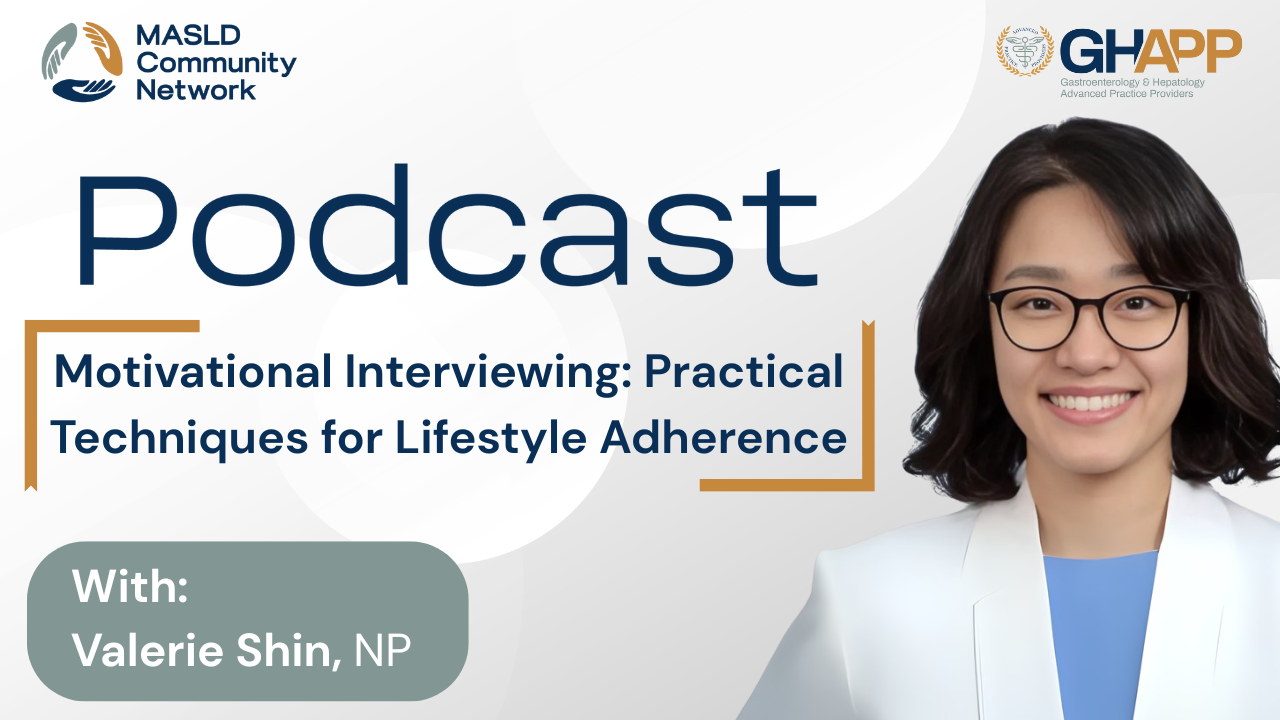
Motivational Interviewing: Practical Techniques for Lifestyle Adherence

Discover how motivational interviewing can transform the management of Metabolic Dysfunction-Associated Steatotic Liver Disease (MASLD) by empowering patients to make sustainable lifestyle changes. In this session, we explore why lifestyle modification—particularly achieving 5–10% weight loss—is the most effective intervention for MASLD, yet often fails when approached through traditional “diet and exercise” advice alone. Learn the four core principles of motivational interviewing—expressing empathy, developing discrepancy, rolling with resistance, and supporting self-efficacy—and how to apply them in real-world clinical encounters to improve patient engagement and outcomes. Through practical strategies, sample dialogue, and a compelling patient case study, this discussion highlights how small, achievable changes in diet and physical activity can reduce hepatic inflammation, improve insulin resistance, and even reverse fibrosis. Whether you’re a hepatology provider, primary care clinician, or allied health professional, you’ll gain actionable tools to activate patient motivation, overcome barriers, and support lasting behavioral change in MASLD care.
Watch Now

Podcast: Alcohol and MASLD/MASH: Navigating the Complex Relationship

In this powerful and highly educational episode, Scott Springer, PA-C at Erie County Medical Center in Buffalo, NY, explores the complex and often overlooked relationship between alcohol use and metabolic dysfunction–associated steatotic liver disease (MASLD/MASH). Drawing from his dual expertise in hepatology and addiction medicine, Scott outlines the importance of accurately assessing alcohol use when diagnosing MASLD, MASH, MetALD, or ALD—emphasizing that MASLD and MASH are diagnoses of exclusion and heavily influenced by alcohol consumption thresholds. He discusses best practices for screening, including patient-centered, nonjudgmental interviewing, the use of biomarkers like PEth and urine ethyl glucuronide, and how these tools enhance accuracy and accountability in care. Scott reviews national guidelines that recommend alcohol abstinence for patients with chronic liver disease and presents data showing how even small reductions in alcohol use can significantly lower the risk of cirrhosis. He also unpacks the challenges of interpreting liver tests in patients with ongoing alcohol use, the limitations of non-invasive testing like FibroScan and FIB-4, and how alcohol may disqualify patients from emerging pharmacotherapy such as resmetirom. Finally, he highlights the promising potential of GLP-1 medications in managing both liver fibrosis and alcohol use. This episode is essential listening for hepatology providers, addiction specialists, and any clinician involved in the care of patients with coexisting liver disease and substance use disorders.
Watch Now
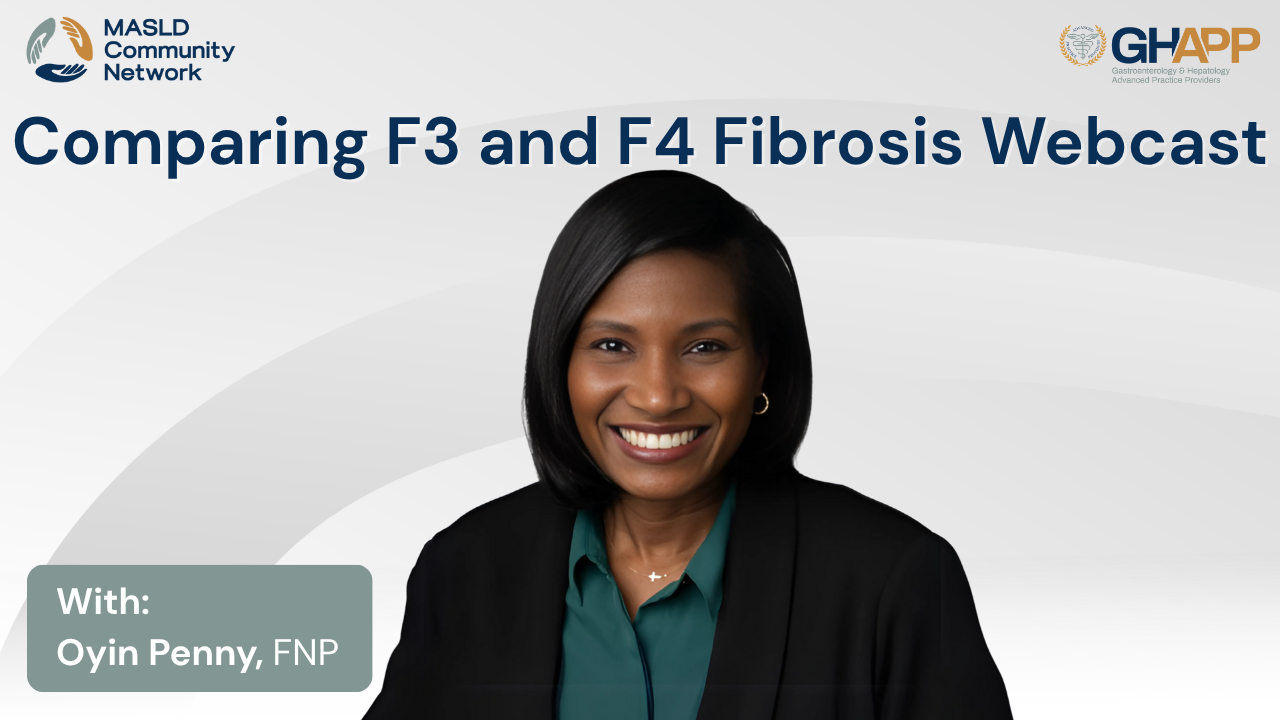
Comparing F3 and F4 Fibrosis With Oyin Penny

Understanding the differences between F3 and F4 fibrosis is crucial in the management of MASH (Metabolic Associated Steatohepatitis) and other liver diseases. In this session with Oyin Penny, FNP, from the GHAPP MASLD Community Network, we explore a case-based comparison using non-invasive tests (NITs), including FibroScan, ELF score, and Fib-4, to highlight how staging impacts prognosis, treatment strategies, and long-term outcomes. Case 6A focuses on a patient with F3 fibrosis, discussing lifestyle modification, metabolic disease optimization, and the role of therapies like Resmetirom (Rezdiffra). Case 6B revisits the same patient profile but with F4 fibrosis, emphasizing advanced management including HCC surveillance, EGD screening for varices, and consideration of non-selective beta blockers. By contrasting these scenarios, this presentation underscores the importance of accurate fibrosis staging, risk stratification, and timely interventions to improve patient outcomes.
Watch Now
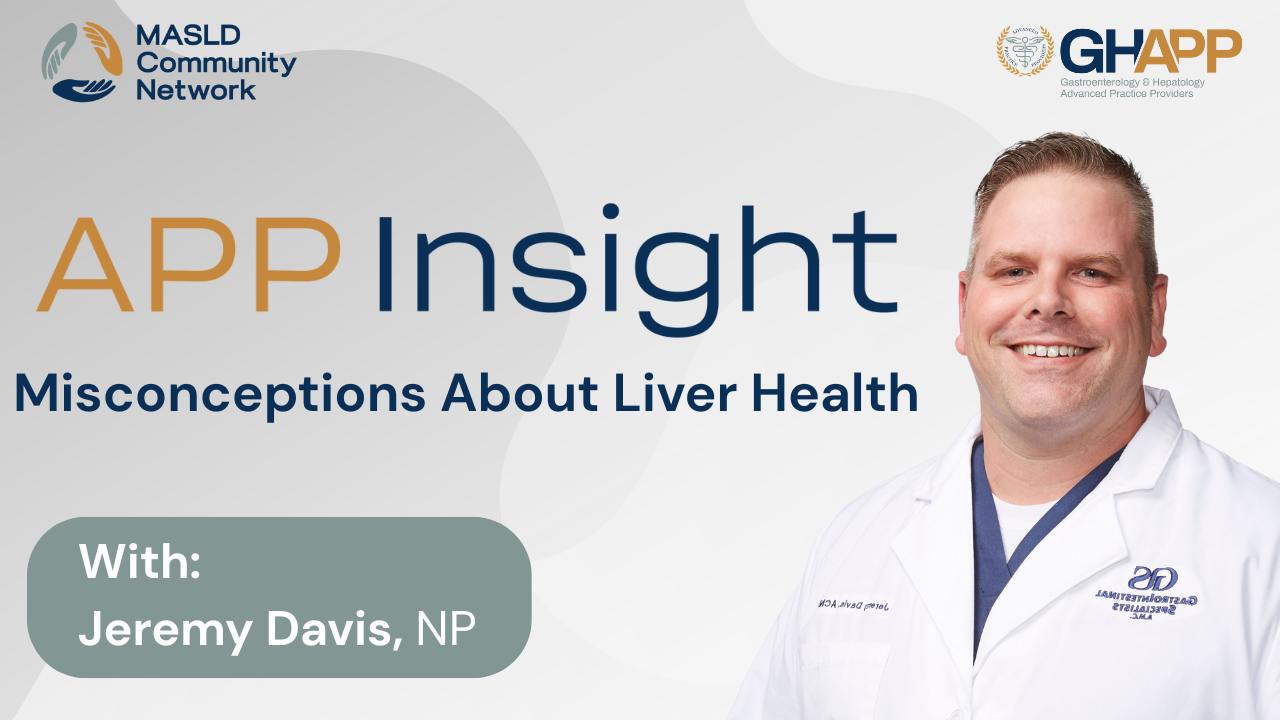
Misconceptions About Liver Health

In this quick but powerful video, Jeremy Davis, NP from Shreveport, Louisiana, addresses some of the most common misconceptions about liver health that he encounters in clinical practice. Many patients believe that liver disease only occurs in people who drink alcohol, but Jeremy explains how conditions like MASLD (Metabolic dysfunction-associated steatotic liver disease) and MASH (Metabolic-associated steatohepatitis) can affect individuals regardless of alcohol use. He also clears up the myth that only overweight patients are at risk, pointing out that co-morbidities such as hypertension, high cholesterol, cardiovascular disease, and type 2 diabetes can contribute to liver disease—even in patients with a normal BMI. Finally, Jeremy explains why normal liver enzyme labs (ALT and AST) don’t always rule out liver disease, making it crucial to assess underlying risk factors and improve provider and patient awareness. This video is a valuable resource for both healthcare professionals and patients looking to better understand non-alcoholic liver disease and why early screening matters.
Watch Now
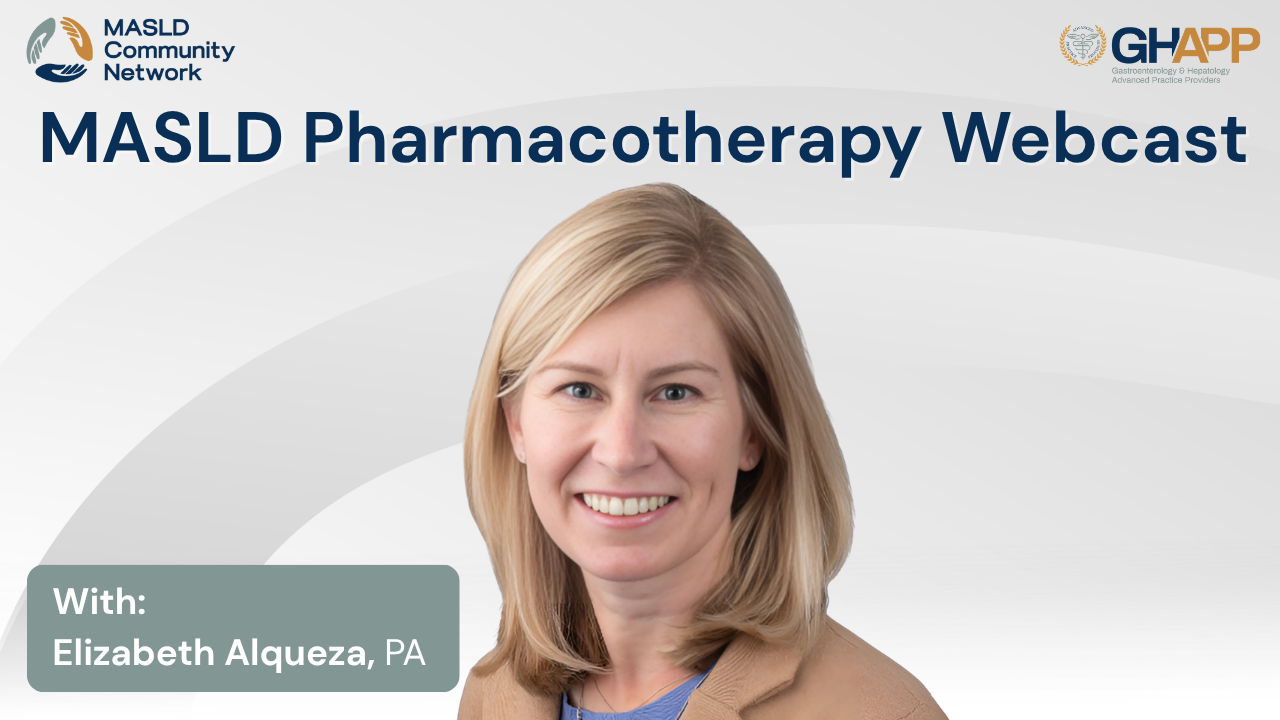
MASLD Pharmacotherapy With Elizabeth Alqueza

In this presentation, Elizabeth Alqueza, PA at Beth Israel Deaconess Medical Center, provides a comprehensive overview of pharmacotherapy for Metabolic Dysfunction–Associated Steatotic Liver Disease (MASLD) and MASH. She highlights the latest treatment strategies, including lifestyle modifications, cardiovascular risk reduction, and targeted liver-directed therapies. Elizabeth reviews the role of GLP-1 receptor agonists in weight loss and liver health, the evidence for Vitamin E and Pioglitazone in select patients, and the landmark approval of Resmetirom (Rezdiffra)—the first FDA-approved therapy for MASH with moderate to advanced fibrosis. Drawing from clinical trial data, including the MAESTRO-NASH trial, she explains mechanisms of action, efficacy outcomes, safety considerations, and practical prescribing guidance. This session underscores the importance of combining non-invasive testing, lifestyle interventions, and emerging pharmacologic therapies to improve patient outcomes and prevent progression to cirrhosis and liver-related complications.
Watch Now
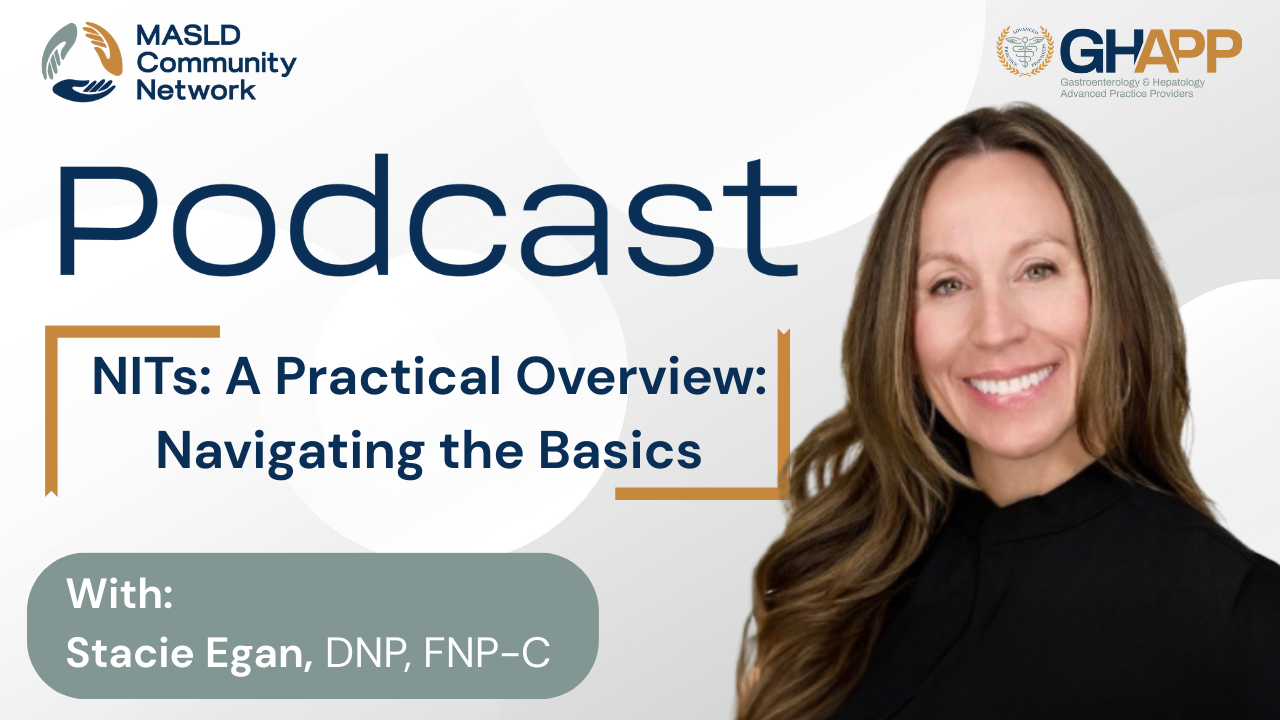
NITs: A Practical Overview: Navigating the Basics

In this educational session, Stacie Egan, NP, from Ogden Clinic Gastroenterology, explores the critical role of non-invasive testing (NITs) in diagnosing and managing MASLD (Metabolic Dysfunction–Associated Steatotic Liver Disease) and MASH (Metabolic Dysfunction–Associated Steatohepatitis). Stacy explains the key differences between MASLD—fat accumulation without active damage—and MASH, where inflammation and cellular injury drive fibrosis, cirrhosis, and hepatocellular carcinoma. Understanding this distinction is vital for early detection and intervention. This session also highlights how ALT levels, metabolic comorbidities, and alcohol use should influence decision-making, and why combining test results with clinical context ensures accurate risk stratification. Clinicians will learn how to use NITs not as standalone diagnostics, but as integrated puzzle pieces that drive earlier treatment with lifestyle modification and emerging pharmacotherapies for F2–F3 fibrosis. Perfect for APPs, NPs, and GIs managing patients with fatty liver disease, this video offers a clear roadmap to detect, monitor, and manage MASH with fibrosis—improving outcomes while minimizing invasive procedures.
Watch Now
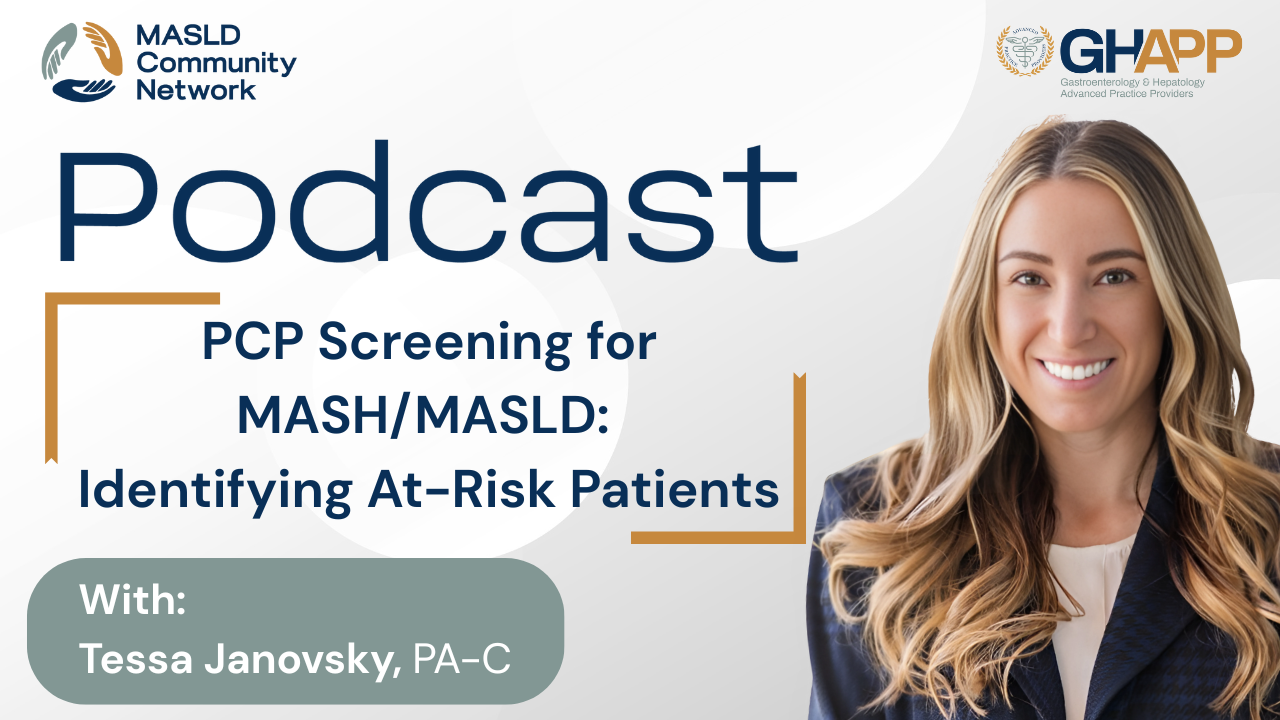
PCP Screening for MASH/MASLD: Identifying At-Risk Patients

Join Tessa Janovsky, PA-C from Arizona Liver Health, for a practical and guideline-based discussion on screening for Metabolic Dysfunction-Associated Steatotic Liver Disease (MASLD) and Metabolic Dysfunction-Associated Steatohepatitis (MASH) in primary care. This session outlines which patient populations Advanced Practice Providers (APPs) should routinely screen—such as individuals with type 2 diabetes, medically complicated obesity, metabolic risk factors with fatty liver on imaging, moderate alcohol use (MetALD), or a family history of MASH cirrhosis. Learn how to apply first-line non-invasive screening tools like FIB-4 and the NAFLD Fibrosis Score, understand their limitations, and incorporate them into busy clinic workflows. Tessa shares strategies for communicating positive results to patients, next steps for further evaluation (ELF test, FibroScan, MRI elastography), and criteria for timely referral to gastroenterology or hepatology. With practical tips for integrating MASLD/MASH screening into electronic medical records, building clinical pathways, and standardizing protocols, this episode equips PCPs and specialists to detect high-risk patients earlier, intervene effectively, and ultimately improve liver health outcomes.
Watch Now
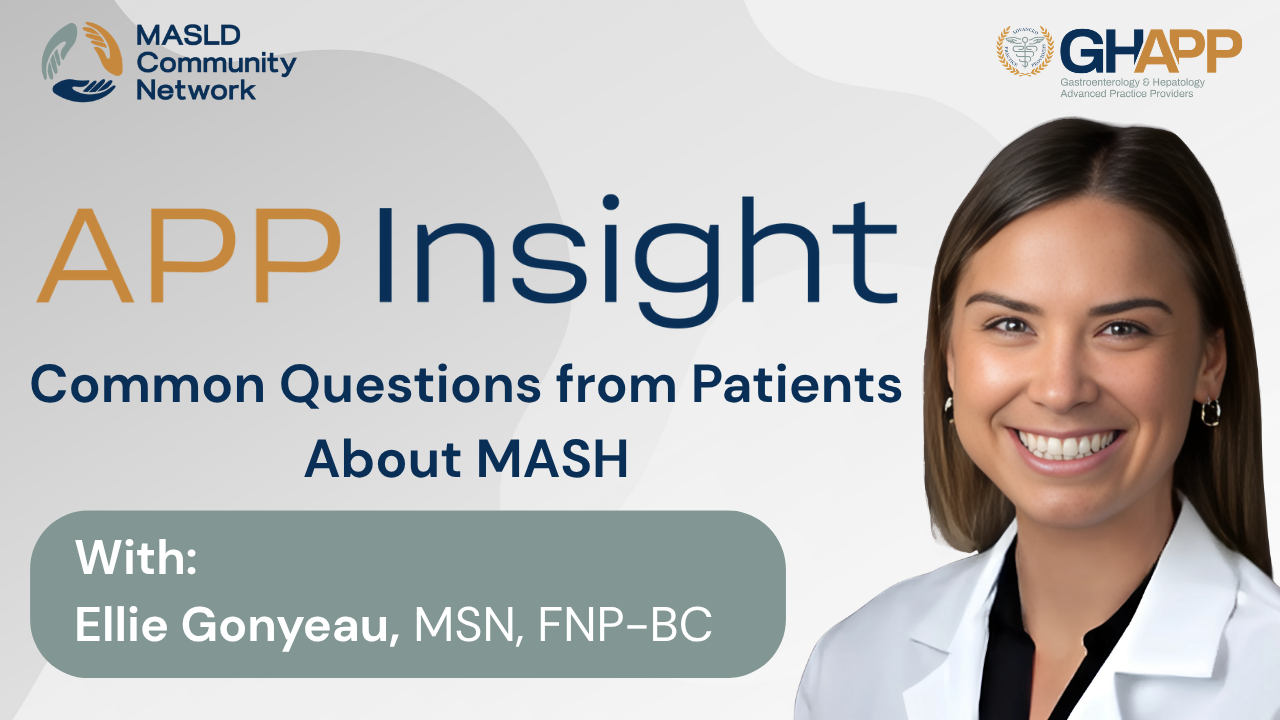
Common Questions From Patients About MASH

In this informative video, Ellie Gonyeau, a nurse practitioner in general gastroenterology at Beth Israel in Boston, answers some of the most common questions she hears from patients about MASLD (Metabolic dysfunction-Associated Steatotic Liver Disease). With compassion and clarity, Ellie addresses concerns about the seriousness of the condition, explaining that while MASLD can progress to advanced liver disease, early intervention can make a significant difference. She emphasizes the importance of not delaying care and encourages patients to take manageable steps—like losing just 5–10% of their body weight—to reduce liver inflammation and slow disease progression. Nutrition, exercise, and proactive conversations are central to her patient-centered approach. Whether you're newly diagnosed or seeking guidance, this episode offers valuable, practical insights for anyone navigating MASLD. #MASLD #FattyLiver #LiverHealth #GIcare #BethIsrael #NursePractitioner #Gastroenterology #PatientEducation #LiverDisease #WeightLossSupport
Watch Now
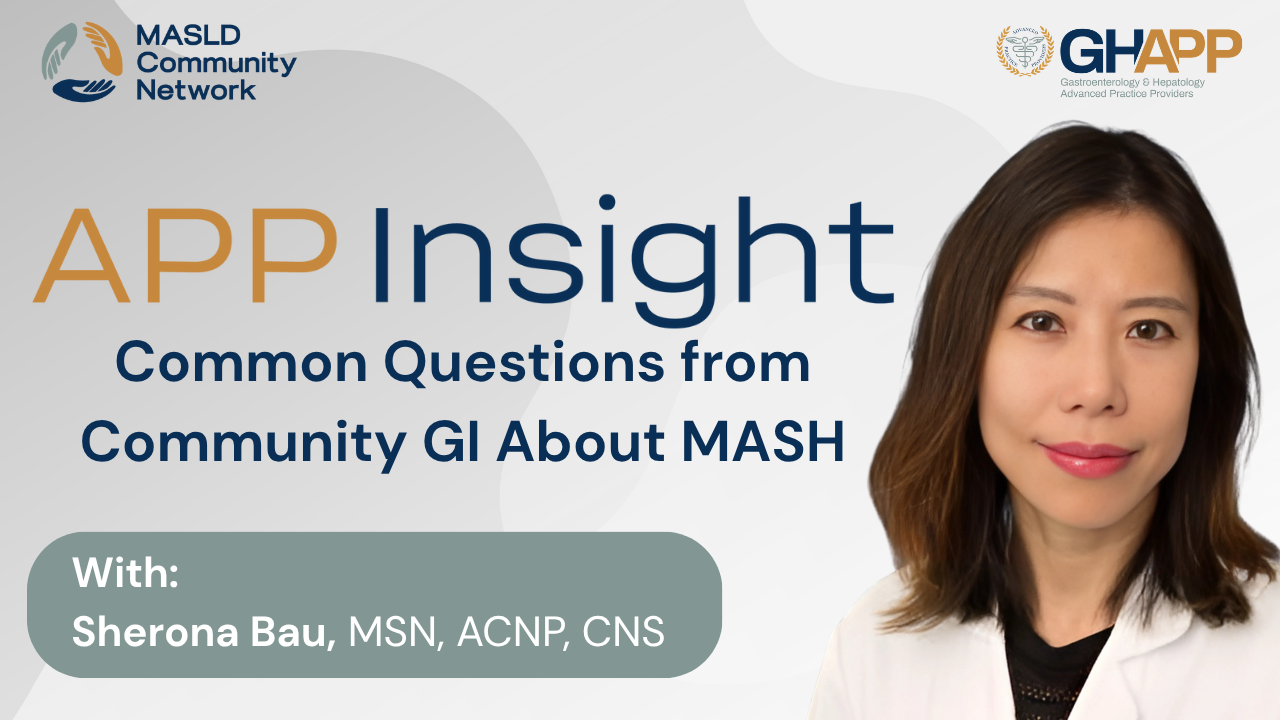
Common Questions from Patients About MASH

In this impactful episode, Sherona Bau, NP from UCLA, addresses the most frequent and pressing questions patients ask after being diagnosed with MASLD (Metabolic dysfunction-associated steatotic liver disease) or MASH (Metabolic-associated steatohepatitis)—including concerns about life expectancy, risk of liver failure, liver cancer, and genetic impact on family members. She emphasizes the importance of risk stratification using non-invasive testing, particularly FibroScan®, to determine the extent of fat accumulation and liver fibrosis. Sherona explains that early identification of stage 2 or 3 fibrosis is critical, as treatment options are now available for these stages, offering hope for patients. She also stresses that MASLD is not just a liver disease—it's a systemic, metabolic condition—and encourages coordinated care with endocrinologists, cardiologists, and dietitians. Additionally, she discusses the hereditary nature of fatty liver and the importance of family screening, especially for children of affected individuals. This video offers clear, compassionate guidance for patients and providers navigating the complexities of fatty liver disease.
Watch Now
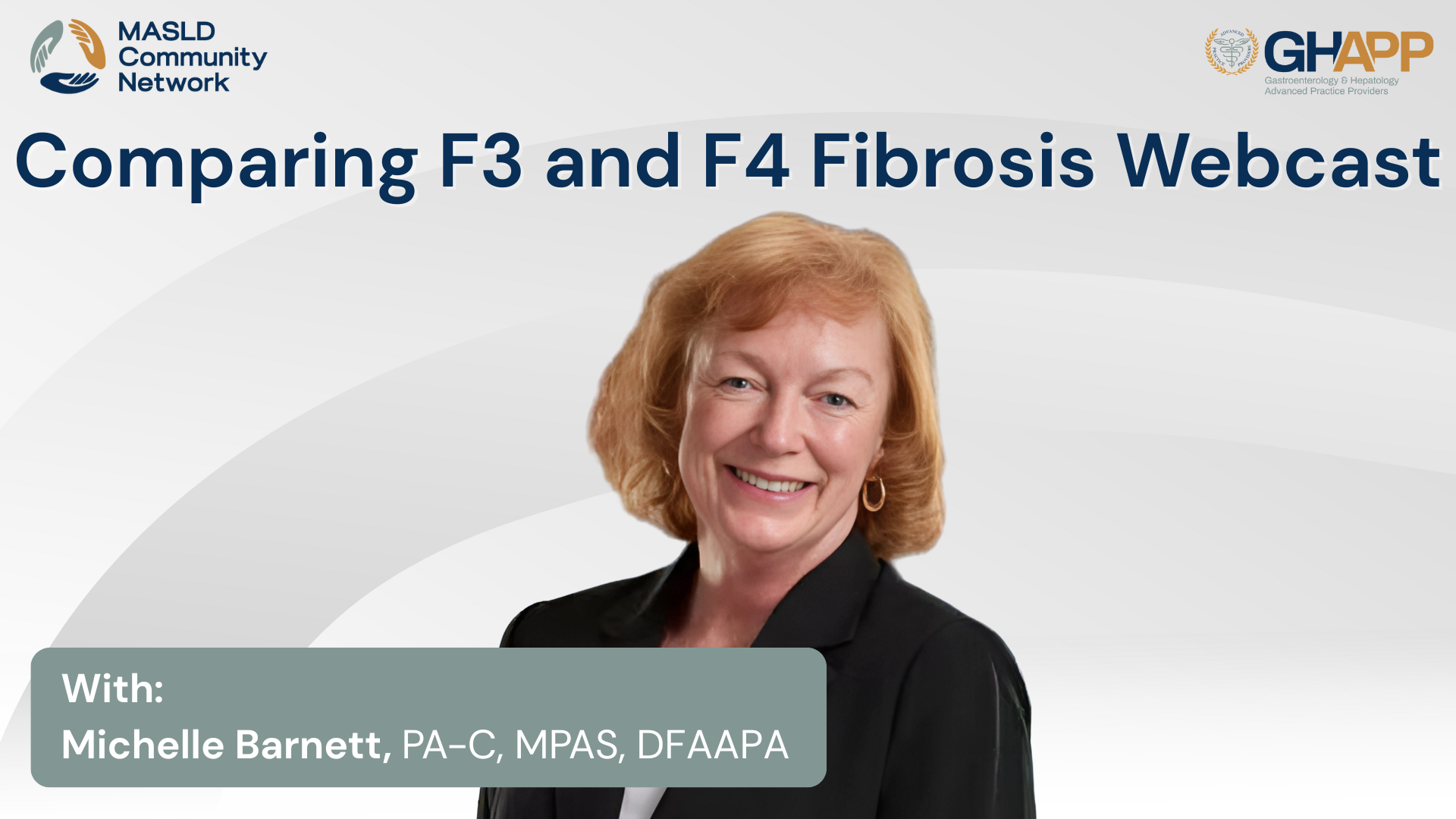
Comparing F3 and F4 Fibrosis With Michelle Barnett

In this installment of the GHAPP MASLD Community Network, Michelle Barnett, PA-C from Peak Gastroenterology in Colorado Springs, presents a deep dive into the clinical management of MASH—formerly known as NASH or non-alcoholic steatohepatitis. Through two comparative case studies, Michelle explores the nuances of diagnosing and managing patients with F3 and F4 fibrosis. Learn how to effectively use non-invasive diagnostic tools like FIB-4, FibroScan, and ELF testing, and gain valuable insights into stratifying fibrosis risk, monitoring hepatocellular carcinoma (HCC), and determining when resmetirom is appropriate. This session also covers practical guidance on nutrition, exercise, medication safety, and multidisciplinary care for patients with advanced liver disease. Whether you're a hepatology specialist or a primary care provider navigating the MASLD/MASH landscape, this video offers actionable strategies to improve long-term patient outcomes and reinforces the critical role of lifestyle intervention and liver disease surveillance.
Watch Now





 September 2025
September 2025 